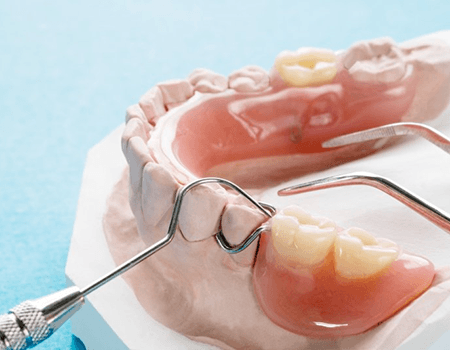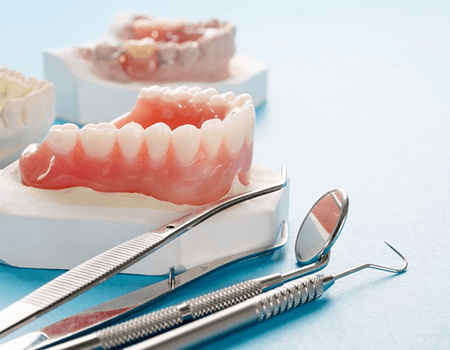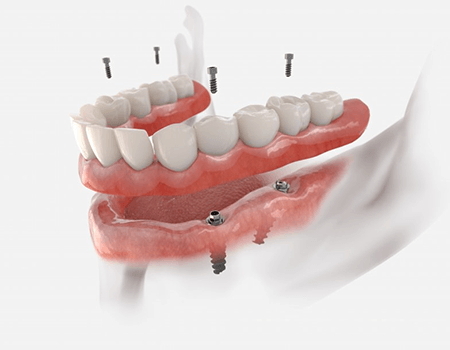
Dentures – Willow Grove, PA
Reliable & Lifelike Solution for Replacing Missing Teeth
If you’ve been struggling with moderate to severe tooth loss, then you know how life-changing the situation is. Other than impacting the way you look and your self-confidence, missing some or all of your pearly whites can also affect your ability to eat and talk. The good news is that you can address this issue with natural-looking dentures in Willow Grove! Our team at Advanced Smile Design can create your new set of teeth that can renew your beautiful smile as well as provide multiple benefits for your oral health. Keep reading to learn more or call us to schedule a visit.

Why Choose Advanced Smile Design for Dentures?
- Durable & Natural-Looking Dental Materials
- Advanced & Precise Dental Technology
- Accepts Insurance & Financing Options
Who Is a Good Candidate for Dentures?

In many cases, people who are missing one or more of their teeth can be candidates for dentures. For this treatment to work, however, you’ll need to have good oral health and be committed to implementing a strict oral hygiene regimen. Of course, our team will first evaluate your mouth and situation during your initial appointment to determine if you’re eligible for the process. If we detect any underlying problems such as decay, gum disease, or an infection, we’ll be sure to address them before moving forward with creating your dentures.
Types of Dentures

This restorative treatment has been used for decades, and it’s easy to see why it’s so popular. Dentures are a cost-effective and straightforward method for conveniently renewing a person’s smile and boosting their self-esteem. During your initial consultation, we’ll assess your situation and walk you through the different kinds of dentures that can help you.
Partial Dentures

Some patients experience losing one or several of their teeth. If this is your case, then we might recommend partial dentures. These prosthetics are custom-designed to fit your specific smile while only replacing the particular pearly whites that you’re missing. They consist of a gum-colored base and the teeth are typically kept in position via small metal clasps that wrap around nearby teeth.
Full Dentures

If all of your teeth are gone, then full dentures will be the viable solution for restoring your bite. Similar to partials, this option also comes with a gum-colored base but isn’t held in place with metal clasps. Instead, these prosthetics rely on the natural suction of your gum line for support. You may also use a small amount of denture adhesive to help keep it in position.
Implant Dentures

Instead of using natural teeth or your gums for supporting your dentures, you can choose to get dental implants embedded into your jawbone. Your restoration(s) will then be attached to the metal posts, as your facial structure will provide the stable foundation necessary for regaining the majority of your natural chewing power. Not only will your new teeth remain sturdy, but your results can also preserve your jawbone and last several decades to a lifetime with proper care!
Benefits of Dentures

Losing multiple teeth can make everyday activities like eating and speaking difficult. Dentures offer a transformative solution for those missing several or all of their teeth, enhancing quality of life. With dentures, you can regain confidence in your smile and enjoy improved functionality. If tooth loss has been a struggle, dentures provide a fresh start, offering benefits that rejuvenate your oral health and appearance.
Psychological Benefits

Having gaps in your smile can be tough, affecting self-esteem, social life, and even causing sadness. Those uncomfortable with tooth loss might avoid socializing. Luckily, dentures bring back smiles and function, boosting confidence. They help eliminate concerns about appearance, speech, and eating, encouraging social interaction while reducing anxieties. With dentures, edentulous individuals (those without teeth) can regain their self-assurance, enhancing both their appearance and overall well-being.
Clearer Enunciation

When teeth are missing, speaking can be challenging. Proper tongue and lip positioning is essential for clear pronunciation. Dentures fill this gap, enabling clearer speech. After a brief adjustment and practice, you'll speak naturally, as dentures act like your real teeth, ensuring more confident and articulate communication.
Improves Nutrition

Eating nutritious foods is essential, but missing teeth can hinder proper chewing, causing digestion problems and malnutrition. Dentures solve this by enabling effective chewing, leading to a varied diet rich in healthful vegetables, fruits, and proteins. With dentures, you can nourish your body more efficiently, ensuring it receives the vital nutrients necessary for optimal overall health.
Preserves Oral Health

Choosing dentures when you have some natural teeth left can prevent them from shifting in your mouth. Dentures also share the load of chewing, decreasing strain on your remaining teeth and reducing wear and tear. By doing so, dentures contribute to maintaining the alignment of your teeth and promoting overall oral health.
Expands Opportunity

Your smile is a significant aspect of your first impression. Whether it's a job interview, sales pitch, or seeking promotions, a complete smile holds significant advantages. A 2019 study revealed that poor oral health is linked to decreased employment prospects. Prioritizing your smile can positively impact professional opportunities, underlining the value of maintaining good oral health for career success.
Understanding the Cost of Dentures

Even if you need dentures, you may hesitate due to their price. That much is understandable – prosthetic teeth won’t help if they “break the bank.” However, the cost of dentures varies from patient to patient. That reality means you must consult our dentists for an exact estimate. Once you have, the Advanced Smile Design team will strive to make your care affordable. We’ll even walk you through dentures’ cost factors and available payment options. To learn more, keep reading or call us in the coming days.
Factors That Affect the Cost of Dentures

At your initial consultation, our team will perform an oral exam. This step reviews (among other things) factors relevant to your dentures’ final price. These include:
- The Need for Prep Work – Dentures will cost more if you need prep work before getting them. For instance, pulling a tooth first will add to your expense.
- Denture Base Material – Truthfully, the acrylic in a denture's base can cost more or less. Durable and lifelike kinds tend to be pricier.
- Replacement Teeth Quality – A denture’s artificial teeth are either acrylic or porcelain. Acrylic ones are cheap but wear quickly, while porcelain kinds are longer-lasting but cost more.
Even as you assess these factors, remember that the cheapest dentures aren’t ideal. Such models typically use subpar acrylic for their bases and teeth. That being the case, make sure to choose higher-quality prosthetics!
Are Implant Dentures More Expensive?

Technically, implant dentures have a higher upfront cost than standard ones. However, their benefits justify this extra expense.
Firstly, note that implant dentures use dental implants – restorations that fuse with your jaw. In doing so, these prosthetics remain secure and stable; they’ll never slip or fall. Better yet, their permanence ensures they look and act like natural teeth.
At the same time, implant dentures are an excellent long-term investment. Their implants can last 15-30 years with proper care, giving them a greater lifespan than typical dentures. As a result, the high price they entail is offset by needing fewer replacement visits.
Does Dental Insurance Cover Dentures?

In most cases, dental insurance does cover dentures. These prosthetic teeth are typically counted as a major procedure. As such, many dental policies see them as “medically necessary” and match 50% of their cost.
That said, there are some exceptions. Your insurance plan may limit its denture coverage. Therefore, make sure to confirm your benefits before treatment. Our office can help you do so if necessary.
Other Options for Making Dentures Affordable

Even if you don’t have insurance, there are other ways to make dentures affordable. In particular, many dental practices offer a variety of payment options. With the right one, prosthetic teeth don’t have to exceed your budget.
Consider our own Advanced Smile Design, for example. We happen to offer the following:
- In-House Savings Plan – For an annual fee of $299, our in-house savings plan will give you a 20% discount on denture treatment.
- Flexible Financing – As it happens, our practice works with both CareCredit and Sunbit. These financiers allow patients to pay for treatment with monthly, low-interest installments. That way, you can meet the cost of dentures gradually instead of all at once.
As you can see, Advanced Smile Design can make your dentures effective and budget-friendly. So, please book a consultation with our office and see us soon!
Dentures FAQs

If you plan to get dentures, you’re on the right track. These dental restorations will give you a full smile and so much more! However, you should learn the basics of treatment first. Doing so ensures you know what to expect from your new teeth. Fortunately, Advanced Smile Design can help on that front. Below are the answers to oft-asked questions about dentures in Willow Grove. By reading them, you’ll grasp how our prosthetics work. For more details, please call our office.
What is the Average Age for Dentures?
While tooth loss can happen to anyone, it occurs more often in seniors. It’s thus older adults who most often wear dentures. Their oral problems put them at high risk of missing teeth.
Current research lends support to this conclusion. Firstly, the National Center for Health Statistics finds that 66% of those aged 40-64 lack at least one tooth. (In contrast, only 33% of adults in their twenties are missing teeth.) Furthermore, the American Dental Association concluded that 57% of 65–74-year-olds wear dentures.
Will It Hurt to Get Dentures?
When getting dentures, discomfort levels can vary. Whether (and to what extent) you ache from the process will depend on your situation.
If you undergo tooth extraction before denture work, you’ll likely face some pain post-surgery. In that case, you should take prescribed pain medication as directed. Your discomfort will improve about 3-5 days after the initial extraction.
Once your new dentures are placed, minor irritation may occur as your mouth adjusts. This symptom’s duration changes from person to person. (In many cases, it lasts months.) If the new denture replaces an old one, adjustment may take longer.
Can I Sleep with My Dentures?
Typically, no – you shouldn’t sleep with your dentures. Dentists recommend that you take them out at night before bed. (The only exception is the first day with them. You’ll be told to wear them for 24 hours to ensure a proper fit – sleep time included.)
You see, wearing dentures constantly causes oral issues. The habit restricts gum circulation, leading to soft tissue irritation and enhanced ridge resorption. It also increases tongue plaque levels and your risk of pneumonia. Meanwhile, taking dentures out at night lets your gums rest and keeps germs from accumulating.
Will Dentures Change the Shape of My Face?
When they work correctly, dentures will change the shape of your face. Don’t worry, though – this effect is a good thing!
If you didn’t already know, facial muscles sag when you lose teeth. This process can lead to a sunken look if left untended. That said, dentures work to give those muscles support. The result is a general improvement in your appearance.
Of course, things don’t always occur as planned. You may get ill-fitting dentures that don’t support your facial muscles well. Should that happen, see your dentist as soon as possible. They can have the prosthetic(s) refitted or replaced as needed.
